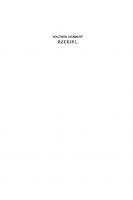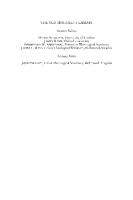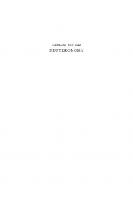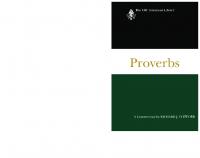Ecclesiastes: A Commentary (The Old Testament Library) 0664228038, 0664212956, 9780664228033
This volume, a part of the Old Testament Library series, explores the book of Ecclesiastes. The Old Testament Library p
138 85 4MB
English Pages 196 [197] Year 1987
Title
Copyright
Contents
Recommend Papers
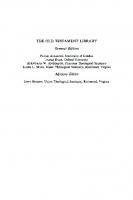
- Author / Uploaded
- James L. Crenshaw
File loading please wait...
Citation preview
ISBN 0-664-22803-8
,!7IA6G4-c iad !:t;K;k;K;k ,!7IA6G4-cciadd!
6.00 x 9.00
6.00 x 9.00
.441 BH
JAMES L. CRENSHAW
ECCLESIASTES
THE OLD TESTAMENT LIBRARY General Editors PETER ACKROYD, University of London JAMES BARR, Oxford University BERNHARD W. ANDERSON, Princeton Theological Seminary JAMES L. MAYS, Union Theological Seminary, Richmond, Virginia
Advisory Editor JOHN BRIGHT, Union Theological Seminary, Richmond, Virginia
JAMES L. CRENSHAW
A Commentary
THE WESTMINSTER PRESS PHILADELPHIA
© 1987 James L. Crenshaw
All rights reserved-no part of this book may be reproduced in any form without permission in writing from the publisher, except by a reviewer who wishes to quote brief passages in connection with a review in magazine or newspaper. Scripture quotations from the Revised Standard Version of the Bible are copyrighted 1946, 1952, © 1971, 1973 by the Division of Christian Education of the National Council of the Churches of Christ in the U.S.A. and are used by permission. Excerpts from James B. Pritchard, ed., The Ancient Near East: An Anthology of Texts and Pictures, copyright© 1958 by Princeton University Press, are reprinted by permission of the publishers. Book design by Gene Harris First edition Published by The Westminster Press® Philadelphia, Pennsylvania PRINTED IN THE UNITED STATES OF AMERICA 98765432
Library of Congress Cataloging-in-Publication Data Crenshaw, James L. Ecclesiastes : a commentary. (The Old Testament library) Bibliography: p. 1. Bible. O.T. Ecclesiastes-Commentaries. I. Title. II. Series. BS1475.3.C74 1987 223'.807 87-16053 ISBN 0-664-21295-6
CONTENTS Preface
7
Abbreviations
9
Selected Bibliography
11
Introduction
23
Qohelet's Teachings
23
Literary Expression
28
The Meaning of the Name Qohelet
32
Literary Integrity and Structure
34
The Historical Setting
49
The Larger Environment
51
Canonization
52
The Text
53
A Plea to Readers
53
Commentary
55
1:1
The Superscription
55
1:2-3
Motto and Thematic Statement
57
1:4-11
Nothing New Under the Sun
61
1:12-2:26
The Royal Experiment
68
3:1-15
A Time for Everything
91
3:16-4:3
The Tears of the Oppressed
101
4:4-6
Proverbial Insights About Toil and Its Opposite
107
6
Contents
4:7-12
The Advantages of Companionship
109
4:13-16
The Fickle Crowd
112
4:17-5:8 [5:1-9 Eng.]
Religious Obligations
114
5:9-6:9 [5:10-6:9 Eng.]
The Disappointments of Wealth
119
6:10-12
A Transitional Unit
130
7:1-14
A Collection of Proverbs
132
7:15-22
On Moderation
140
7:23-29
Seeking and Finding
144
8:1-9
Rulers and Subjects
148
8:10-17
The Mystery of Divine Activity
153
9:1-10
The Shadow of Death
158
9:11-12
Time and Chance
164
9:13-18
Wasted Wisdom
165
10:1-20
A Collection of Proverbs on Wisdom and Folly
168
11:1-6
The Element of Risk
178
11:7-12:7
Youth and Old Age
181
12:8
Thematic Statement (lnclusio)
189
12:9-14
The Epilogue(s)
189
PREFACE In writing this commentary I have received extraordinary assistance from three persons, Marti Steussy, Michael V. Fox, and Judy Matthews Taylor, to whom I hereby express my deepest appreciation. The first two read my manuscript and made valuable suggestions for its improvement, and the third transformed my handwritten text into a typescript that could easily be prepared for publication. In addition, Michael made available to me a copy of his forthcoming commentary on Qohelet, which is especially strong on the linguistic aspects of the book. Roland E. Murphy extended a similar kindness, allowing me to see the typescript of his commentary on Ecclesiastes that will appear shortly in the Hermeneia series. Both Michael and Roland shared offprints with me as well, and in this significant expression of collegiality others have also joined, most notably Robert Gordis (whose commentary on Qohelet was indispensable), R. Norman Whybray, Anton Schoors, Graham Ogden, John Gammie, and Addison D. Wright. My indebtedness to others, with whom my relationship is less personal, is no less real. Any attempt to list those scholars-living and dead-who have informed my thinking about Qohelet is doomed to fail, but the following deserve special notice: Delitzsch, Barton, and Ginsberg for relentless attention to language and syntax; Podechard for thoroughness, especially the introductory material; Ginsburg for a history of research; Loretz for the study of the ancient Near Eastern parallels; Whitley for philological observations; Hertzberg and Lauha for comprehensiveness; Braun for the Greek background; Ellermeier and Kroeber for special syntactical problems; Lohfink for literary features; Zimmerli for theological insights; Lys for philosophical probings; and Barucq for cautious examination of the status of research on Qohelet. A major portion of the research during the final stages of writing this book was made possible by a fellowship from the John Simon Guggenheim Memorial Foundation for the academic year 1984-85. That project, "The Depiction of Old Age in Ancient Near Eastern Wisdom Literature," focused on the exquisite poem in Eccl. 11:7-12:7 and enabled me to explore the larger context of Qohelet in a way that would otherwise have been impossible. I wish by this means to express my profound gratitude to Joel
8
Preface
Conarroe, President of the John Simon Guggenheim Memorial Foundation, for its generous support of my research. This book is dedicated to Austin S. and Grace Rhodes Bobo, who for many years have provided a home away from home for my wife and me. JAMES
Vanderbilt Divinity School
L. CRENSHAW
ABBREVIATIONS AB ANET AST/ ATD BASOR BDB BHK BHS BHT Bib BKAT BO BTB BZ BZAW CBQ E ET ETL ExpT FOTL GKC HAR HAT HS HSAT HUCA IB ICC IDB IDBSup Int ITQ JAOS
Anchor Bible Ancient Near Eastern Texts Relating to the Old Testament, ed. by J. B. Pritchard, 2nd. ed., Princeton, 1955 Annual of the Swedish Theological Institute Das Alte Testament Deutsch Bulletin of the American Schools of Oriental Research *Brown, Driver, and Briggs, Hebrew and English Lexicon Biblia Hebraica, ed. by Rudolf Kittel, 1937 *Biblia Hebraica Stuttgartensia, 1978 Beitriige zur historischen Theologie Biblica Biblischer Kommentar Altes Testament Bibliotheca Orienta/is Biblical Theology Bulletin Biblische Zeitschrift Beihefte zur Zeitschrift fiir die alttestamentliche Wissenschaft Catholic Biblical Quarterly English (where numbering differs from the Hebrew) English translation Ephemerides Theologicae Lovanienses Expository Times The Forms of the Old Testament Literature *Gesenius-Kautzsch-Cowley, Hebrew Grammar Hebrew Annual Review Handbuch zum Alten Testament Hebrew Studies Die Heilige Schrift des Altes Testament Hebrew Union College Annual Interpreter's Bible, ed. by G. A. Buttrick, 12 vols., Nashville, 1952-57 International Critical Commentary Interpreter's Dictionary of the Bible, ed. by G. A. Buttrick, 4 vols., Nashville, 1962 Interpreter's Dictionary of the Bible, Supplementary Volume, ed. by K. Crim, Nashville, 1976 Interpretation Irish Theological Quarterly Journal of the American Oriental Society
JO JBL JBR JJS JNES JPS JQR JSOT JSS JTS KAT KHAT NAB OLZ OTS PAAJR PEQ RB RHPR RSV SAIW SJT SPOA STU TDOT TR TSK TTZ
TZ UF VT VTSup WMANT WTJ WZLU
ZAS ZAW
ZDMG ZDPV ZTK
Abbreviations Journal of Biblical Literature Journal of Bible and Religion (now Journal of the American Academy of Religion) Journal of Jewish Studies Journal of Near Eastern Studies *Jewish Publication Society translation (Tanakh) Jewish Quarterly Review Journal for the Study of the Old Testament Journal of Semitic Studies Journal of Theological Studies Kommentar zum Alten Testament Kurzer Hand-Commentar zum Alten Testament New American Bible Orientalistische Literaturzeitung Oudtestamentische Studien Proceedings of the American Academy of Jewish Research Palestine Exploration Quarterly Revue Biblique Revue d'Histoire et de Philosophie Religieuses Revised Standard Version *Studies in Ancient Israelite Wisdom, ed. by J. L. Crenshaw Scottish Journal of Theology Les sagesses du Proche-Orient ancien (Colloque de Strasbourg, 1962), Paris, 1963 Schweizerische Theologische Umschau Theological Dictionary of the Old Testament, ed. by G. J. Botterweck and H. Ringgren, Grand Rapids, 1974Theologische Rundschau Theologische Studien und Kritiken Trierer theologische Zeitschrift Theologische Zeitschrift Ugaritische Forschungen Vetus Testamentum Supplements to Vetus Testamentum Wissenschaftliche Monographien zum Alten und Neuen Testament Westminster Theological Journal Wissenschaftliche Zeitschrift Leipziger Universitiit Zeitschrift fur iigyptische Sprache und Altertumskunde Zeitschrift far die alttestamentliche Wissenschaft Zeitschrift der deutschen morgenliindischen Gesellschaft Zeitschrift des deutschen Paliistina-Vereins Zeitschrift far Theologie und Kirche
For full details of entries marked
* see
Bibliography
SELECTED BIBLIOGRAPHY A. Translations, Texts, Dictionaries, and Grammars The Revised Standard Version of the Bible. The New English Bible. Tanakh: The Holy Scriptures. Philadelphia: Jewish Publication Society, 1985. (Also published in three volumes; vol. 3, The Writings, 1982.) Biblia Hebraica Stuttgartensia. Ed. by Kurt Elliger and Wilhelm Rudolph. Stuttgart, 1967-77. Septuaginta. Ed. by Alfred Rahlfs. Stuttgart, 1962. Biblia Sacra. luxta Vu/gatem Versionem. Ed. by Robert Weber. Stuttgart, 1969. Baumgartner, Walter, and J. J. Stamm, eds. Hebriiisches und aramiiisches Lexicon zum A/ten Testament. 3rd edition. I (1967), II (1974), III (1983). Leiden. Brown, Francis; S. R. Driver; and C. A. Briggs. A Hebrew and English Lexicon of the Old Testament, with an Appendix Containing the Biblical Aramaic. Oxford, 1907. Gesenius, F. W., Hebrew Grammar, rev. by E. Kautzsch; 2nd English edition, ed. and tr. by A. E. Cowley. Oxford, 1910. Hatch, E., and H. A. Redpath. A Concordance to the Septuagint and the other Greek Versions of the Old Testament (including the Apocryphal Books). Oxford, 1897. Jastrow, Marcus. A Dictionary ofthe Targumim, the Talmud Babli and Yerushalmi, and the Midrashic Literature. New York, 1950. Joiion, Paul. Grammaire de l'hebreu biblique. Rome, 1955. Kohler, Ludwig, and Walter Baumgartner, eds. Lexicon in Veteris Testamenti Libras. 2nd edition, Leiden, 1958. Williams, Ronald J. Hebrew Syntax. 2nd edition. Toronto, 1976. B. Commentaries, Monographs, and Articles on Qohelet and Related Topics Allgeier, A. Das Buch des Predigers oder Koheleth. HSAT VI, 2. Bonn, 1925. Alster, Bendt. The Instruction of Suruppak. Copenhagen, 1974. - - - . Studies in Sumerian Proverbs. Copenhagen, 1975. Armstrong, J. F. "Ecclesiastes in Old Testament Theology," Princeton Seminary Bulletin 94 (1983) 16-25. Barton, George A. The Book of Ecclesiastes. ICC. Edinburgh, 1908 (reprint, 1959). Barucq, Andre. Ecclesiaste. Paris, 1968. - - - . "Qoheleth." Supplement au Dictionnaire de la Bible, ed. by Henri Cazelles & Andre Feuillet. Paris, 1977.
12
Selected Bibliography
Baumgartel, F. "Die Ochsenstacheln und die Nagel in Koh 12,11," ZAW 81 (1969) 98. Beentjes, P. C. "Recente visies op Qohelet," Bijdragen: Tidschrift voor Filosojie en Theologie 41 (1980) 436--444. Bertram, Georg. "Hebriiischer und griechischer Qohelet," ZA W 64 (1952) 26-49. Bickell, Gustav. Der Prediger iiber den Wert des Daseins. Innsbruck, 1884. Bickerman, Elias. Four Strange Books of the Bible. New York, 1967. Bishop, E. F. F. "Pessimist in Palestine," PEQ 100 (1968) 33-41. Blank, Sheldon H. "Ecclesiastes," 7-13 in IDB II. Nashville, 1962. - - - . Prolegomenon to C. D. Ginsburg, Coheleth. New York, 1970. Braun, R. Kohelet und diefriihhellenistische Popularphilosophie. BZA W 130. Berlin and New York, 1973. Bream, Howard N. "Life Without Resurrection: Two Perspectives from Qoheleth," 49-65 in A Light Unto My Path (Jacob M. Myers Festschrift). Gettysburg Theological Studies 14, 1974. Breton, S. "Qoheleth Studies," BTB 3 (1982) 22-50. Bruns, J. Edgar. "The Imagery of Eccles. 12,6a," JBL 84 (1965) 428-430. Buccellati, Giorgio. "Wisdom and Not: The Case of Mesopotamia," JAOS 101 (1981) 35-47. Buzy, Denis. "Le portrait de la vieillesse (Ecclesiaste, xii,1-7)," RB 41 (1932) 329-340. - - . "La notion du bonheur dans l'Ecclesiaste," RB 43 (1934) 494--511. - - - . L 'Ecc/esiaste. Paris, 1946. Camp, Claudia V. Wisdom and the Feminine in the Book ofProverbs. Sheffield, 1986. Castellino, G. "Qohelet and His Wisdom," CBQ 30 (1968) 15-28. Ceresko, A. R. "The Function of Antanaclasis (mf 'to find'// m.f' 'to reach, overtake, grasp') in Hebrew Poetry, Especially in the Book of Qoheleth," CBQ 44 (1982) 551-569. Chopineau, Jacques. "L'image de Qohelet dans l'exegese contemporaine," RHPR 59 (1979) 595-603. Corre, A. D. "A Reference to Epispasm in Koheleth," VT 4 (1954) 416-418. Cosser, William. "The Meaning of 'Life' in Proverbs, Job, and Ecclesiastes," Glasgow University Oriental Society Transactions 15 (1953/54) 48-53. Crenshaw, James L. "The Eternal Gospel (Eccl. 3:11)," 23-55 in Essays in Old Testament Ethics, ed. by James L. Crenshaw and John T. Willis. New York, 1974. ---,ed. Studies in Ancient Israelite Wisdom (SAIW). New York, 1975. - - - . "The Shadow of Death in Qoheleth," 205-216 in Israelite Wisdom: Theological and Literary Essays in Honor of Samuel Terrien, ed. by John G. Gammie. Missoula, Mont., 1978. ---."The Birth of Skepticism in Ancient Israel," 1-19 in The Divine Helmsman, ed. by James L. Crenshaw and Samuel Sandmel. New York, 1980. - - - . Old Testament Wisdom. Atlanta, 1981. - - - , ed. Theodicy in the Old Testament. Philadelphia and London, 1983a. - - . "Qohelet in Current Research," HAR 7 (1983b) 41-56. - - - . A Whirlpool of Torment. Philadelphia, 1984. - - - . "The Wisdom Literature," 369-407 in The Hebrew Bible and Its Modern
Selected Bibliography
13
Interpreters, ed. by Douglas A. Knight and Gene M. Tucker. Philadelphia and Chico, Calif., 1985. - - . "Education in Ancient Israel," JBL 104 (1985) 601-615. - - . "The Expression mfyodea' in the Hebrew Bible," VT 36 (1986) 274-288. - - . "Youth and Old Age in Qoheleth," HAR 11 (1987). ---."Ecclesiastes," Harper's Bible Commentary. San Francisco (forthcoming). - - - . Art. on "Ecclesiastes," Evangelisches Kirchenlexikon (forthcoming). Criisemann, Frank. "Die unveriinderbare Welt. i.iberlegungen zur 'Krisis der Weisheit' beim Prediger (Kohelet)," 80-104 in Der Gott der kleinen Leute, ed. by Willi Schottrotf and Wolfgang Stegemann. Munich, 1979a (ET, The God of the Lowly, Maryknoll, N.Y., 1984). - - - . "Hiob und Kohelet. Ein Beitrag zum Verstiindnis des Hiobbuches," 373393 in Werden und Wirken des A/ten Testaments, ed. by A. Albertz et al. Gottingen, 1979b. Dahood, Mitchell J. "Canaanite-Phoenician Influence in Qoheleth," Bib 33 (1952) 30-52, 191-221. - - . "Qoheleth and Recent Discoveries," Bib 39 (1958) 302-318. - - . "Qoheleth and Northwest Semitic Philology," Bib 43 (1962) 349-365. - - . "Canaanite Words in Qoheleth 10,20," Bib 46 (1965) 210-212. - - . "The Phoenician Background of Qoheleth," Bib 47 (1966) 264-282. ---."The Phoenician Contribution to Biblical Wisdom," 123-148 in The Role of the Phoenicians in the Interaction of Mediterranean Civilizations, ed. by W. A. Ward. Beirut. Delitzsch, Franz. Kohe/eth. Leipzig, 1875. (ET, Commentary on the Song of Songs and Ecclesiastes, Edinburgh, 1877.) Delsman, W. C. "Zur Sprache des Buches Koheleth," 341-365 in Von Kanaan bis Kera/a. Neukirchen-Vluyn, 1982. Dhorme, P. "L'Ecclesiaste ou Job," RB 32 (1923) 5-27. Dieterle, Christiane. "A propos de la traduction de l'Ecclesiaste et de la Bible en franr). It functions to dramatize inner thoughts. The author carries on a conversation with himself, thinking aloud, weighing the present situation and his own intellectual accomplishments. This self-critique leaves no room for modesty, particularly since Solomon's legendary wisdom and wealth have inspired the royal fiction. The term higdaltf may allude to I Kings 10:23, 26 although the word is a common one and the two texts employ different syntax. The Solomonic legend was broader than implied by this verse in Kings, but later comments by Qohelet include riches as well as knowledge. The two verbs might also be translated together: "I greatly acquired" (GKC, 120d). (The fundamental sense of yllsap is to add or increase.) Qohelet's fondness for verbs with similar meanings is well documented "Qohelet characteristically repeats lo'-yukal, and one could make a case for its composition in the course of the argument. However, other poets also used repetition freely. One can read the aphorism as a realistic observation about the necessity of accepting things as they are and going on about one's business. In context it makes an altogether oppressive impact, whatever its original meaning. "Galling thinks it refers to a crooked back and to the shortened spine that caused an old person to be bent over permanently, but Zimmerli relates the phrase to inattentive students. ' 6 "Now King Solomon was greater than all the kings of the land with regard to riches and wisdom" (cf. I Chron. 29:25).
The Royal Experiment
75
(1:13, dr's and twr,· 2:26, 'sp and kns). The use of the preposition 'im with libbi is normal, although Qohelet also uses be (2:1, 15, belibbi). With 'im the verb dbr is used, and 'mr is associated with b•. Whitley (14) compares Ahiqar 1:25 to the latter use with be. Dahood's (1966, 266) attempt to understand the second "'nt as a corrupt form of 'oni (wealth) is not required by the text. Nevertheless, his translation supplies a parallel to hokmlJ.h: "I magnified wealth and increased wisdom." Whitley (14-15) writes that the Hiphil of gdl is transitive and reflexive, whereas the Qal is intransitive. Besides this text, only Eccl. 2:12 and 9:13 use the verb rlJ.'lJ.h with hokmlJ.h. The object ofQohelet's observing is ethical and speculative knowledge. [17] Qohelet uses a waw consecutive with imperfect (elsewhere only in 4:1, 7) to indicate that a substantial period has elapsed during which he has observed every kind of wisdom and its practical implementation. Otherwise the expression resembles his determination in 1: 13 to search for and probe everything by means of reason. The dual infinitives in 1:13 lend plausibility to the Massoretic accentuation, which implies that the second da'at is an infinitive, the lamed attached to the first da'at governing both. However, the mention of wisdom and knowledge in 1: 16 suggests that these words are repeated in 1:17. That is how the ancient versions (Septuagint, Peshitta, Vulgate) understood the verse: the first infinitive governed four objects. 27 The words for madness (from hi/, to rage, shout) and folly are doubly perplexing. First, they do not seem to belong here, for Qohelet launches an experiment of wisdom at this point and only later will tum to evaluate madness and folly. Second, hOl~/Ot is an abstract plural, although siklut is an abstract singular form. In Ecclesiastes hOl~lot appears in 10: 13. Outside Ecclesiastes the plural participle hO/elim (dissolute people) is found in Pss. 5:6; 75:5. Although siklut is found here, everywhere else in Ecclesiastes the form siklut occurs (2:3, 12, 13; 7:25; 10:1, 13), and some manuscripts have s rather than s in 1: 17. The meaning is therefore "folly" rather than wisdom (the meaning of ski). This confusion of s ands was common in late Hebrew.28 Whitley (16) gives several examples: Job 5:2; 6:2; 10:17; 17:7 (k'S for k's, anger); Ezra 4:5 (skrm for skrm, hiring). In Biblical Aramaic the tendency continued: kSdy' in Dan. 5:30, but ksdy' in Ezra 5:12; sbk' in Dan. 3:10, 15 but sbk' in Dan. 3:5. In extrabiblical Aramaic the shift was intensified (skltnw in Dan. 5:11, 12 but ski in Ahiqar 1:47). Jerome comments on this verse: contraria contrariis intelliguntur (con"Gordis thinks the meaning is "to know that wisdom and knowledge are madness and folly." "Qohelet gives maimerat in 12:11 for masm•rot.
76
Ecclesiastes 1:12-2:26
traries are understood by means of their opposites). Qohelet frequently sets opposites over against each other in this manner (2:12; 7:25; 8:16), following a precedent set by the authors of Proverbs, who used antithesis and juxtaposed aphorisms (26:4-5). The expression seggam zeh hu' occurs in Gen. 6:3 without the zeh. Qohelet often uses hu' as a copulative. The words ra'yon rt2ah echo the earlier r"'ut rt2ah. [18] Acquisition of knowledge is no small achievement. Dense or uncooperative students required extra incentive, so parents and teachers freely applied the cane, believing that the results justified such cruelty. Egyptian and Sumerian scribal texts attest to the prevalence of punishment in schools. Late descriptions of Dame Wisdom agree that her demands are burdensome at first. Qohelet understood the educational process to be painful, but unlike his predecessors, he found the result equally unpleasant. Open eyes see the injustices of society, and wider awareness of oppression and life's absurdities is disquieting. Furthermore, Qohelet understood the limits that restrict human knowledge, stifling the desire to know and confounding attempts to achieve comprehensive knowledge. The repetition in this verse is only partly a function of parallelism. On the subconscious level the doubling of terms (riJb/rob, yostp/y0stp) and selection of synonyms (hokmDh/da'at; kD'as 29 /mak'ob) call up the tedium of the learning process. (Only the conjunction ki fails to double.) Within the larger unit ( 1: 16-18) the words hokmDh and da 'at occur four times each, 30 and the roots rb and ysp three times. Qohelet's great increase in wisdom brings a surplus of trouble as well. [2:1] Having concluded that wisdom and reason alone do not satisfy, Qohelet turns to evaluate sensual pleasure, again using the literary device of conversation with himself. 31 (Cf. the Egyptian "Dialogue Between a Man and His Soul.") The Hebrew image is that of rational deliberation, a conversation with one's personified mind. Qohelet urges his heart to launch yet another test. Although the language is polite in the extreme, the imperative lends urgency. Qohelet submits himself to a new test. The word "'nassekDh (I will test you) appears to derive from the root nsh; the ending is a long form of the second-person pronoun. 32 The means of the test is simhDh Goy). This word covers pleasures from religious ecstasy to sexual excess. The second imperative, r"'eh (see), has the nuance of "experience." Will the pleasures of the body transcend the sober excitement of learning? "ka'as is used elsewhere in 2:23; 7:9; 11:10. ••yada 'ti is used once also. "In 1:16 the variant dibbartf '





